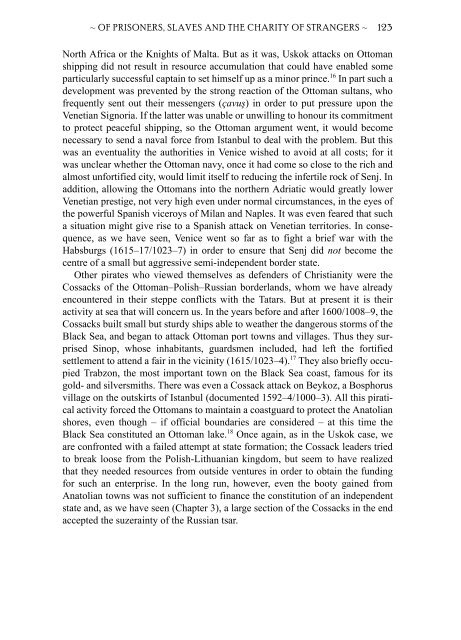The Ottoman Empire and the World Around It - Course Information
The Ottoman Empire and the World Around It - Course Information
The Ottoman Empire and the World Around It - Course Information
You also want an ePaper? Increase the reach of your titles
YUMPU automatically turns print PDFs into web optimized ePapers that Google loves.
~ OF PRISONERS, SLAVES AND THE CHARITY OF STRANGERS ~ 123<br />
North Africa or <strong>the</strong> Knights of Malta. But as it was, Uskok attacks on <strong>Ottoman</strong><br />
shipping did not result in resource accumulation that could have enabled some<br />
particularly successful captain to set himself up as a minor prince. 16 In part such a<br />
development was prevented by <strong>the</strong> strong reaction of <strong>the</strong> <strong>Ottoman</strong> sultans, who<br />
frequently sent out <strong>the</strong>ir messengers (çavuş) in order to put pressure upon <strong>the</strong><br />
Venetian Signoria. If <strong>the</strong> latter was unable or unwilling to honour its commitment<br />
to protect peaceful shipping, so <strong>the</strong> <strong>Ottoman</strong> argument went, it would become<br />
necessary to send a naval force from Istanbul to deal with <strong>the</strong> problem. But this<br />
was an eventuality <strong>the</strong> authorities in Venice wished to avoid at all costs; for it<br />
was unclear whe<strong>the</strong>r <strong>the</strong> <strong>Ottoman</strong> navy, once it had come so close to <strong>the</strong> rich <strong>and</strong><br />
almost unfortified city, would limit itself to reducing <strong>the</strong> infertile rock of Senj. In<br />
addition, allowing <strong>the</strong> <strong>Ottoman</strong>s into <strong>the</strong> nor<strong>the</strong>rn Adriatic would greatly lower<br />
Venetian prestige, not very high even under normal circumstances, in <strong>the</strong> eyes of<br />
<strong>the</strong> powerful Spanish viceroys of Milan <strong>and</strong> Naples. <strong>It</strong> was even feared that such<br />
a situation might give rise to a Spanish attack on Venetian territories. In consequence,<br />
as we have seen, Venice went so far as to fight a brief war with <strong>the</strong><br />
Habsburgs (1615–17/1023–7) in order to ensure that Senj did not become <strong>the</strong><br />
centre of a small but aggressive semi-independent border state.<br />
O<strong>the</strong>r pirates who viewed <strong>the</strong>mselves as defenders of Christianity were <strong>the</strong><br />
Cossacks of <strong>the</strong> <strong>Ottoman</strong>–Polish–Russian borderl<strong>and</strong>s, whom we have already<br />
encountered in <strong>the</strong>ir steppe conflicts with <strong>the</strong> Tatars. But at present it is <strong>the</strong>ir<br />
activity at sea that will concern us. In <strong>the</strong> years before <strong>and</strong> after 1600/1008–9, <strong>the</strong><br />
Cossacks built small but sturdy ships able to wea<strong>the</strong>r <strong>the</strong> dangerous storms of <strong>the</strong><br />
Black Sea, <strong>and</strong> began to attack <strong>Ottoman</strong> port towns <strong>and</strong> villages. Thus <strong>the</strong>y surprised<br />
Sinop, whose inhabitants, guardsmen included, had left <strong>the</strong> fortified<br />
settlement to attend a fair in <strong>the</strong> vicinity (1615/1023–4). 17 <strong>The</strong>y also briefly occupied<br />
Trabzon, <strong>the</strong> most important town on <strong>the</strong> Black Sea coast, famous for its<br />
gold- <strong>and</strong> silversmiths. <strong>The</strong>re was even a Cossack attack on Beykoz, a Bosphorus<br />
village on <strong>the</strong> outskirts of Istanbul (documented 1592–4/1000–3). All this piratical<br />
activity forced <strong>the</strong> <strong>Ottoman</strong>s to maintain a coastguard to protect <strong>the</strong> Anatolian<br />
shores, even though – if official boundaries are considered – at this time <strong>the</strong><br />
Black Sea constituted an <strong>Ottoman</strong> lake. 18 Once again, as in <strong>the</strong> Uskok case, we<br />
are confronted with a failed attempt at state formation; <strong>the</strong> Cossack leaders tried<br />
to break loose from <strong>the</strong> Polish-Lithuanian kingdom, but seem to have realized<br />
that <strong>the</strong>y needed resources from outside ventures in order to obtain <strong>the</strong> funding<br />
for such an enterprise. In <strong>the</strong> long run, however, even <strong>the</strong> booty gained from<br />
Anatolian towns was not sufficient to finance <strong>the</strong> constitution of an independent<br />
state <strong>and</strong>, as we have seen (Chapter 3), a large section of <strong>the</strong> Cossacks in <strong>the</strong> end<br />
accepted <strong>the</strong> suzerainty of <strong>the</strong> Russian tsar.


